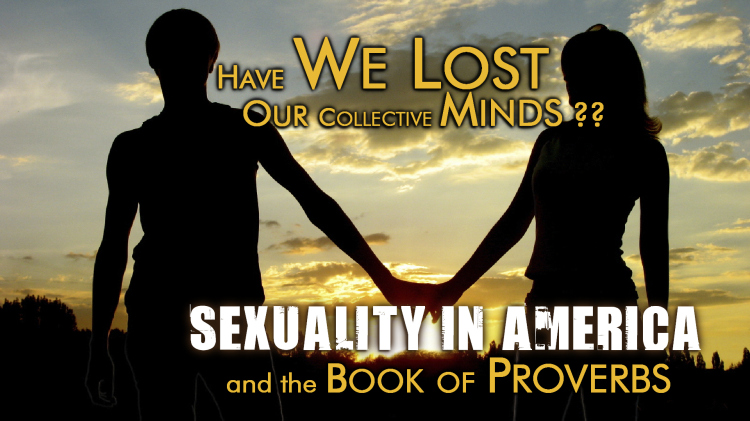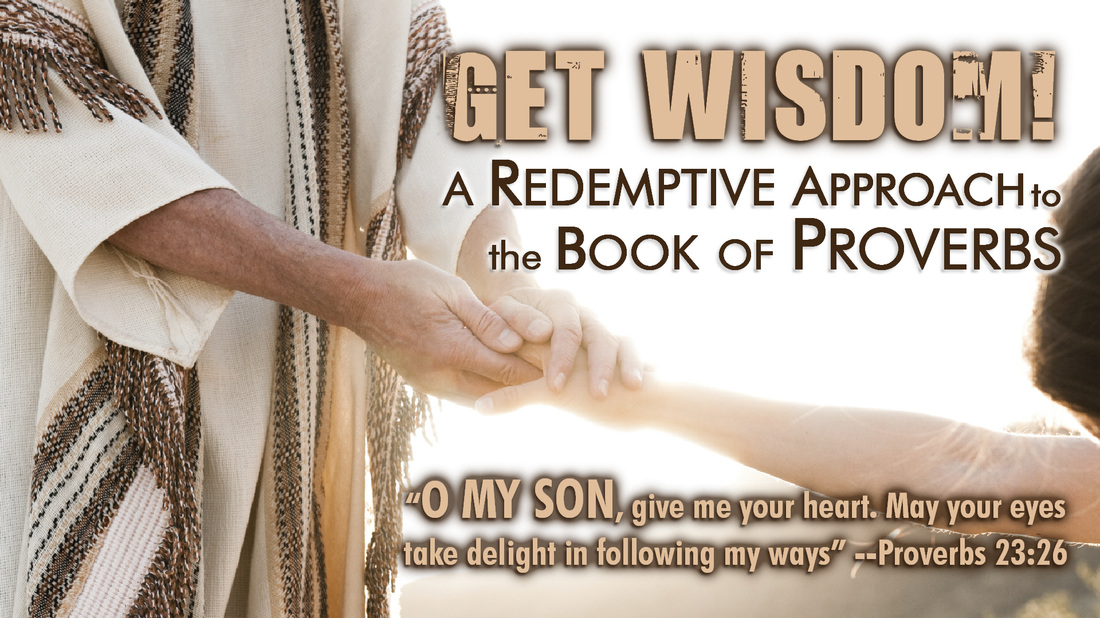|
Songs of Songs, or Song of Solomon, is a book that many people have not quite know what to do with. It is mainly filled with poetry between lovers. exception that it is in the context of marriage, or at least in parts, a bride and groom about to be married or on their wedding night.
Sex in the Bible, of course, is reserved for marriage. And in that sense, Song of Songs presents a different picture of sex. While sex is portrayed everywhere in culture, rarely is it portrayed in a husband-wife relationship. Hot, passionate sex between husband and wife--it does not exist, culture says. Only affairs are portrayed in this way. So, in that sense, by showing that sex between a husband and wife is good and can be passionate, Song of Songs redeems sex. Many Christians get the idea that sex is bad. Any song on the radio that speaks of sex is automatically bad. Even Christian adults in a marriage relationship can think that those are bad songs. (Some Christians even grew up with the idea that dancing in one's own bedroom is bad as well.) Take for instance the following passage from Song of Songs 7:7-12. If you did not know that this were from the Bible, what would be your first reaction if you heard the words to this song on the radio? This is beautiful poetry, but it is pretty explicit. It shows that sex is good, enjoyment of one another's bodies--and heart and emotion and spirit--is good. The physical, sexual relationship in a marriage is good. By not presenting a good, biblical view of sex at age appropriate times, and only speaking of the negatives of sex, we leave people to be shaped by the culture or to have negative views of sex even within Christian marriage. Both views are not good. There is much sexual brokenness today. This is true outside of marriage. But it is true even within Christian marriage. Why? Because of sin and the fall. When God created Adam and Eve, it says that they were naked without shame. But when sin entered into the Garden, Adam and Eve realized that they were naked and felt shamed. Today, of course, there is still sin--sin that we commit, and sin that others commit against us. Those who have been emotionally or physically abused may find it difficult for them to be vulnerable or "naked" with their spouse. Sin damaged the earth physically, and age and decay and cancer entered into the world. These can interfere with a good sexual relationship. Spouses sin against one another with selfishness and biting or hurtful words and actions. Emotional and physical affairs cause much damage. But in Song of Songs, we see what God intends for sex to be like in a marriage. It is no coincidence that the height of the sexual expression is found in the middle of the book of Song of Songs--and that this lovemaking happens in the context of a "garden." Song of Songs 4:12-16 says this: He Says 12 You are a garden locked up, my sister, my bride; you are a spring enclosed, a sealed fountain. 13 Your plants are an orchard of pomegranates with choice fruits . . . 15 You are a garden fountain, a well of flowing water streaming down from Lebanon. She Says 16 . . . Let my beloved come into his garden and taste its choice fruits. Clearly, this is the sexual relationship that God intended for Adam and Eve to have for one another in the Garden of Eden, where they were made to become "one flesh." In this Song of Songs, God shows us the type of sexual relationship he wants for Christian husbands and wives--passionate, overflowing, wild, and loving--with nothing, no sin, between them to hinder the relationship. The more that couples put aside the sin of selfishness that is inside us all, the more that the sexual relationship will blossom. And Paul encourages Christian couples to continue to have sexual relations in 1 Corinthians 7:1-5. The tiredness of the world, sins committed against us, sins of spouses against one another, can all make sexual relations difficult. And yet, withholding sex, except by mutual consent, because their is sin and hurt, is not an option for Christian couples. Paul even says something totally radical here, that one's own body is not one's own. That is a radical kind of oneness that goes beyond just a metaphor. The wife does not have authority over her own body, but must yield it to her husband! Even more radical for that time--the husband does not have authority over his own body, but must yield it to his wife! That is radical stuff. It means that the offer should, in general, always be open unless there is agreement by both parties to abstain--and only then for a time. Of course, Christian love will temper this demand and take into consideration the spouse's state. But this is still radical. It is far different from the occasional offer when the time and circumstances are just right. It may require a change in lifestyle to make this possible in a marriage to allow time and energy for this relationship. It may require a change in attitude. It may require many things that may be hard, but it is still what God calls Christian couples to do. Again, sin and selfishness messes all of this up. That is why the more that spouses seek to be like Christ, the better the sex will be. (And Paul says that sex itself protects against sin and affairs.) Song of Songs gives us a glimpse and understanding of the type of sexual relations a Christian couple ought to strive for in their marriage. Marriage and sexual relations can be difficult. But it can also be incredible, with God's help and blessings and a Christ-centered marriage. What do you think of the image of sexual relations and marriage found in Song of Songs? What challenges do you see? What hope do you draw from this? The Song of Songs, or Song of Solomon, is another piece of Wisdom literature in the Bible. It describes in stark and explicit--though poetic terms--the physical and sexual relationship between a man and a woman, as well as intense emotional longing and romance. Viewed through the rest of Scripture, there is something about this relationship that also is intensely spiritual in nature.
More on all of this later. What I wanted to point out in this post is how much the man and woman, husband and wife, really lay on the compliments. I have outlined some of these below. Now, guys, I would not try most of these lines at home--especially the highlighted ones. Telling your wife that she is like a "mare," that her hair is like a "flock of goats" might get you lying on the coach for a night, rather than its intended effect! But what does this show us about a marriage relationship? Well, one thing it shows is the importance of building up your mate with words of love and admiration! And notice how both the man and the woman do this. Here is a top ten list of compliments from Song of Songs that may not translate very well today!
Which of these ten do you like best? What would be good modern day alternatives? In reading and studying the book of Proverbs this week, I was reminded how God created the world in his Wisdom to work a certain way, and that it is foolish to go against this created order.
One of the topics covered in Proverbs is sexuality. I could not help think that on this issue, our country has lost its collective mind.
Here is one of the many passages on sexuality from Proverbs: Drink water from your own cistern, running water from your own well. Should your springs overflow in the streets, your streams of water in the public squares? Let them be yours alone, never to be shared with strangers. May your fountain be blessed, and may you rejoice in the wife of your youth. A loving doe, a graceful deer-- may her breasts satisfy you always, may you ever be intoxicated with her love. Why, my son, be intoxicated with another man’s wife? Why embrace the bosom of a wayward woman? For your ways are in full view of the LORD, and he examines all your paths. (Proverbs 5:15-21 TNIV). Such a teaching today on sexuality, if discussed in the public square, would be decried as bigoted (why only a man and a woman), antiquated (stay with the wife of your youth--who does that?), boring (what, no sex with strangers or another's man's wife?), and naive (what does love have to do with sexuality?). But Proverbs and the rest of the Bible teaches us that it takes a transformation of the heart to hear the call of Wisdom. And that is only possible through an encounter with Jesus Christ and the giving of a new heart and new spirit through the indwelling of the Holy Spirit in our lives (Ezek. 36:26f). So, to our fellow Christ-followers, while we rightly mourn the ungodliness of the world and the ungodliness that can be found in our own hearts, we cannot preach moralism to the world.The world will only accept God's Wisdom by encountering "Christ Jesus, who has become for us wisdom from God—that is, our righteousness, holiness and redemption" (1 Cor. 1:30). (For more on how Jesus Christ leads us to accept Wisdom from God, click here.) If we want to change the sexual condition of our country, we must change hearts. We must share Christ. Let us do so for Christ's sake, for the world's sake, for our country's sake, for our children's sake, for our sake. What do you think of the current trend in sexuality in America? As Christians, what should be our response? As I state in a previous post on the book of Proverbs, Three Keys to Understanding Proverbs, on the surface, the book of Proverbs seems to be just a collection of wise, pithy sayings on, admittedly significant topics, but that could be viewed as good advice that could be found or offered anywhere--or least, a lot of different places.
But of course, even that surface reading (or, more, likely, a surface pulling out of just random proverbs) would paint a false picture, for the book of Proverbs is God saturated and based upon a God-centered worldview. This is true in particular for the first nine chapters of Proverbs, which is essential for understanding how to use and view chapters 10 through the end of the book. The book of Proverbs also is seemingly devoid of any kind of references to Christ and any direct prophecies of him. This charge is probably true. However, Jesus himself (Luke 24:27f) and the New Testament writers in the way that they used the Old Testament clearly saw that Jesus was the hermeneutical lens through which Scripture was to be viewed. And when we look at the book of Proverbs through our understanding of Christ and the fuller redemptive story, we can see that there are typological and theological links to Jesus ALL throughout Proverbs. Walking through some of the book of Proverbs, here are some of the Christ and redemption themes that can be applied to this book to give us a richer, fuller understanding of the godly wisdom. (Note: I am indebted to Old Testament professor Dr. Glenn Pemberton for helping me understand and appreciate the Wisdom literature (including Proverbs) and of the "First Testament" in its own right, to historical theology professor Dr. John Mark Hicks for some theological insights on Proverbs, numerous articles, and to especially to Johnathan Akins excellent book on "Preaching Christ from Proverbs.")
As a parent, Christian, and minister, I desperately want my children to follow God, accept Christ, and be faithful Christians all of the rest of their lives. When my oldest child was baptized, it was one of the greatest days of my life. My oldest daughter has always had a good heart, love God, and do the right thing. She also has always been a deep thinker, is very smart, and always has had a lot of very good questions about God and faith.
A Powerful Story of a Mother's Sacrifice - Joel Rosenburg's Wife in a WWII Concentration Camp5/8/2015 I am convinced more and more that the essence of preaching is the proclamation of the redemptive story--God reaching out to humanity out of his love, sending Christ to live and sacrificially die for us, and raising Jesus Christ from the dead. It is a story about God taking the blackest of life and bringing light into the world. It is about the restoration of hope through the cross. So for me, no topical preaching lesson will have more impact than if it is connected to this redemptive story. That includes lessons like Mother's Day sermons. The story below tells of a mother's love for her child, which causes her to sacrifice everything for him. ----------------------------------------------------------------------------------------------------------- Solomon Rosenberg, his wife, his two sons, and his mother and father were arrested and placed in a Nazi concentration camp during the Holocaust of WWII. It was a labor camp and the rules were simple: As long as you can do your work, you are permitted to live. When you become too weak to do your work, then you will be exterminated. Rosenberg watched his mother and father being marched off to their deaths when they became too weak to work. He knew that his youngest son, David, would be next because David had always been a frail child. Every evening when Rosenberg came back into the barracks after his hours of labor, he would search for the faces of his family. When he found them, they would huddle together, embrace one another, and thank God for another day of life. One day Rosenberg came back, but he didn't see those familiar faces. He finally discovered his oldest son, Joshua, in a corner, huddled, weeping, and praying. He said, "Josh, tell me it's not true." Joshua turned and said, "It is true, Poppa. Today David was not strong enough to do his work, so they came for him." "But where is your mother?" asked Mr. Rosenberg. "Oh Poppa," he exclaimed. "When they came for David, he was afraid and he was crying. Momma said, ‘There is nothing to be afraid of, David,' and then she took his hand and went with him." ----------------------------------------------------------------------------------------------------------- That, my friends, is powerful. That, my friends, is redemptive. That, my friends, illustrates the kind of love that Christ has for us--a love so strong that he gave himself up for us. I would propose that what we find so good in mothers is that sacrificial, selfless love. It touches us because it points to that incredible sacrifice of Christ and the great redemptive story. Mothers have played an incredible part in this redemptive story, from Eve to Sarah to Tamar to Ruth to Bathsheba to Mary. And they continue to play an incredible part in this story in their lives of daily sacrifice. Mothers, we honor you for who you are and for who you so powerfully remind us of--Jesus Christ! What stories in the Bible do you see that point to the redemptive roles of mothers? Note: I am indebted to Scotland missionary JR Sheets for a discussion that we had today on how to make Mother's Day sermons redemptive. He suggested and we discussed together some of the approaches listed below. Thanks, JR! Mother's Day sermons and the like can be challenging, I think. We want to address the topics that members and guests have on their minds on this day (there is nothing worse than having people show up on the Sunday before Christmas, for instance, and hearing a sermon on where Cain got his wife!). And the Bible does talk about mothers. However, other than Proverbs 31, it does not address really motherhood in an extended topical form, which is what many people are looking for on these days. So how should we approach this? I believe that the role of the preacher is in large part to tell the redemptive story/Story of Redemption in each sermon as much as possible. We are not there to preach mere moralism (though the redemptive story will lead to a higher moral standard), or just to highlight/give honor to different groups (though this can be a part of the redemptive story). We are not there to merely give out knowledge or textual insights (though this can happen, if it is helpful to the message). We are there (even on Mother's Day) to preach and proclaim the redemptive story of Christ throughout the ages. With this in mind, how can we make Mother's Day and other types of topical sermons "redemptive?" Well, the most obvious answer to me is to show how, for instance, mothers fit into God's redemptive plan. Here are some ideas/passages to consider:
To this I would simply add that many mothers feel guilt and feel inadequate in their role in the raising of children, juggled with being a wife or single parent, or working parent. They also may feel hurt or pain at their children having gone astray, and may even blame themselves. And if they cannot have children or have lost children, this is devastating. What are some passages on mothers that you see as being part of the Redemptive Story? How would you approach Mother's Day? This Is the Key to Happiness, According to Psychotherapists
This article in Time magazine tells how the stories that we tell ourselves help determine our happiness. While our ultimate goal in life is not to necessarily bring about "happiness," we can and should seek to help people discover the biblical shalom--goodness, peace, and meaningful life--which often leads to happiness. And changing people's self-understanding by helping them discover and adopt a new story is a way to bring about this happiness. If this is true, then it is yet another reason why our sermons ought to seek to help people enter into the Christian story of redemption. Having stories as illustration is nice, but really, illustrating the purpose and meaning of a life with Christ should be the ultimate goal. By taking this approach, God works through preaching to help people who are depressed about their current lives to see how a life with Christ can "redeem" their life's story and give them meaning and hope. And this, so say the therapists, may bring about greater happiness in this life--and certainly in the life to come. Want an example? How about the apostle Paul and legalism? Before Paul encountered Christ, he was a legalistic,violent man, zealously persecuting Christians. After encountering Christ, he became the most passionate proclaimer of God's grace in all of the New Testament. What are some other biblical and current day stories that could reshape people's self-understanding and give them hope and meaning? |
Search this site for a topic or message illustration or click on the categories below!AuthorDr. James Nored (Doctor of Ministry, Fuller Theological Seminary) is a preacher, evangelist, church consultant, writer, and missional leader located in Fairfax, Virginia, a suburb of Washington, D.C. Categories
All
Recent Posts
Could Good Preaching/Storytelling Bring Happiness? The Power of Threes in Rhetoric If Your Sermon Does Not Contain These Two Things, It Will Fall Flat Why No One Watches Your Sermon Online--and 3 Ways How to Change This Archives
June 2016
|





